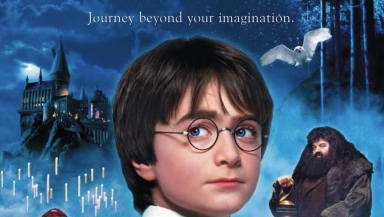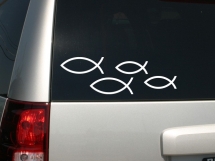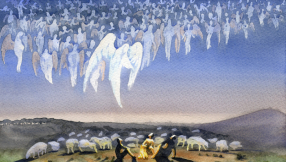If there's one thing we Christians love, it's something to be 'concerned' about in culture. Films, music, 'dangerous' individuals; there's often no end to the things we worry about, and often with justifiable reason. Interestingly though, these concerns often have a way of burning themselves out – either because we come to realise collectively that they're not quite the bogeymen we imagined them to be, or because like frogs in slowly warming water, we just adjust to them. Here are a few pertinent examples, starting with perhaps the clearest of them all...
Harry Potter

I can still remember when Harry Potter angst gripped evangelical Christianity, partly because as an earnest young journalist I was one of it's chief scaremongers. In my unfortunately much-shared article 'Harry Potter, a moving staircase too far?', I actually wrote: "Harry Potter is a large doorway to the occult, and if we lead children to it, there is a possibility that they may nudge it open." I can only apologise, but the shame will never fully leave me.
Today, Harry Potter is rarely mentioned as a source of concern for Christians. In fact, with it's redemptive and ultimately Christ-imitating finale now revealed, many Christian parents are happy for their children to read all seven of JK Rowling's world-conquering novels. Fifteen years on from the first book's release, I'm still yet to hear the story of an actual witch or wizard who took their first steps into magic through Harry Potter's 'occult doorway.'
Shopping on a Sunday
You know that awkward moment when you bump into your small group leader in Tesco straight after church? It's not quite as awkward as it used to be, is it? As Sunday trading has become more of an established fixture in our culture, the Christian position on it seems to have softened markedly. We might not plan our weekly shop for Sunday afternoon (and you'd be mad to do so; it's rammed!) but we're much more relaxed about picking up some sprouts and a Vienetta to jazz up the roast. One fairly conservative friend once told me Sunday trading was ok because it was important that Christians didn't 'subculturise.' I think he'd probably just run out of Vienetta.
Tattoos
This one has seen a massive cultural and theological shift. Despite the commandment against tattoos in Leviticus 19:28, leaders like Mark 'I-couldn't-worship-a-guy-I-could-beat-up' Driscoll have helped tattoos to become a sign of commitment and even worship to God. Celtic symbols, images of Christ and even whole passages of Scripture (sometimes even ones taken from Leviticus...) adorn the arms, chests and shoulder blades of well-exercised bodies around the world. Previously, Christians would have stuck to party lines about the body being a temple of the Holy Spirit; now the Christian cross is an even more popular tattoo among beefcake men (and women) than that heart with an arrow through it that says 'I love Brenda'.
Dungeons & Dragons
I once knew a guy who thought 20-sided dice were 'of the devil'. In the 1980s, several Christian groups raised concerns that the role-playing game Dungeons & Dragons (D&D) was opening up a pathway to sorcery and even Satanism. This wasn't entirely unfounded; the 'advanced' versions of the game included various demonic characters, and 'extreme' rulebooks carried titles such as 'The Book of Vile Darkness'. After the game was linked to the development of mental health issues, and even suicide, there was a broad consensus among evangelical Christians that the game was dangerous, but that sense appears to have almost completely dissipated today. D&D is by no means the cultural behemoth it was in the 1980s, but the RPG movement which sprung from it is still going strong, and has in part led to the development of Massively Multiplayer Online Role Playing Games such as World of Warcraft – a game now enjoyed by many Christians around the world.
(It's important to point out that I've never met a Christian who had a problem with the 80s Dungeons & Dragons cartoon. Which is strange, since there was clearly something very dark and disturbing about that disappearing Dungeon Master fella.)
Modest dress
Having recently caused a stir by wearing a pair of shorts on stage at a Christian conference, I can confirm that the jury's still out on this one. I can remember as a young person in church being told that we should be careful not to dress in ways that might 'cause another to stumble', and girls in particular were careful not to wear clothes that were too revealing. While this tradition is still going strong in some quarters (see the awesome 'Dressing For His Glory' site for evidence), in others the emphasis has diminished. Perhaps that's not such a bad thing – the idea that the way we dress could justify the inappropriate actions of someone else is straight-up victim blaming, and Jesus' words on adultery in Matthew 5:27-30 also place responsibility in the eyes of the stumbler, not on the dresser. That said, there's undoubtedly something very distracting about the body of the opposite sex, and we should probably all do our bit not to trip each other up, especially in church. So: I apologise now to all those who I caused to stumble at the recent Youth Work Summit. I should be more responsible with the body God has given me.
The Da Vinci Code
We all got very upset about Dan Brown's smash-hit novel, which attempted to (fictionally) re-write parts of the gospel story to enable a semi-excting thriller plot in the present day. Then they made a really awful film version with Tom Hanks, and most of us realised that despite impressive sales figures, it probably wasn't going to mount a particularly taxing theological challenge to a 2,000-year-old faith movement. Still, it's a great illustration of how these things often work: cultural happening 'undermines' Christianity; Christians get Very Upset; Christians get quoted in the Daily Mail; Christians release staggering number of 'response' books; everyone forgets and moves on.
Richard Dawkins
I throw this last one in because there's been such an interesting shift in the way that Dawkins – once the chief proponent of the New Atheist movement – is regarded by Christians. At the time of the release of his book The God Delusion, many of us acted like we were genuinely concerned he was about to disprove God's existence and smash Christianity to smithereens. Then some people actually read his book, realised it was full of recycled, straw-man arguments, and everyone breathed a sigh of relief (or released a 'response' book). Principally, Christians were still concerned about the influence of the book, and the amount of media coverage the author was receiving, particularly from left-wing media. Today though, with Dawkins making increasingly barmy pronouncements that have caused many atheists to disown him, he's arguably nudging more people toward exploring the claims of the faith than he's leading away from it.
So what does all this mean? Are we becoming more moderate because that's what it means to be 'wise as serpents, innocent as doves' (Matthew 10:16), or are we just slowly compromising ourselves into a state of total lukewarmness? (If so, worry about Revelation 3:16.) Perhaps it's a mix of both, and if so, the best approach might be two-edged. On the one hand, we should probably be a little less eager to decry or campaign against those elements of our culture which seem to conflict with our faith before we've properly understood them. On the other, it's a good idea to continually assess whether we're really living lives that honour God and reflect his holiness, or turning the radical Christian faith into living what Katie Dowds calls "the PG version of what the world is living."
Martin Saunders is a Contributing Editor for Christian Today and the Deputy CEO of Youthscape. You can follow him on Twitter: @martinsaunders















